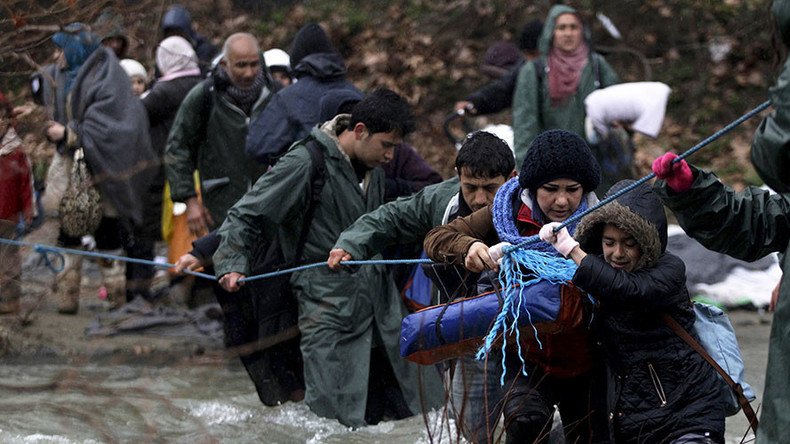EU-Turkey migrant deal hurdled as Cyprus & others slam Ankara ‘blackmail’

A European plan to ease refugee crisis by sending migrants back to Turkey all at once was in serious trouble after Cyprus threatened to derail the deal ahead of Thursday’s summit, and some EU countries accused Ankara of ‘blackmailing’ Brussels.
One day before the start of the next EU-Turkey summit on migration, European countries still face hurdles threatening to undermine the grand refugee deal. As the deal has to be approved by all 28 member states at the summit, EU President Donald Tusk warned on Tuesday that “hard work is ahead,” meaning Brussels’ uneasy talks with Cyprus.
In Nicosia to meet President @AnastasiadesCY ahead of this week's European Council on migration pic.twitter.com/RT34KeDE6K
— Donald Tusk (@eucopresident) 15 марта 2016 г.
All EU actions are aimed at helping a settlement on the Cyprus issue. A settlement would be fresh start for Cyprus, Europe & wider region
— Donald Tusk (@eucopresident) 15 марта 2016 г.
"I conveyed to President Tusk our position that the Republic of Cyprus does not intend to consent to the opening of any chapters if Turkey does not fulfill its obligations as described in the negotiating framework," the Cypriot president was quoted as saying by Reuters after a meeting with Tusk on Wednesday.
Cyprus became the most recent EU country to oppose the Turkey deal. President Nicos Anastasiades said Nicosia would not lift veto on Turkey’s membership talks until Ankara fully recognized Cyprus as a state. In 1974, Turkey invaded the Northern Cyprus, and the two countries have suffered strained relations ever since.
@AnastasiadesCY@YanniKouts you have to be realistic, Turkey has now become a radical Islamist State, flirting with State terrorism..
— Mark Giorgi (@MarkGio1) 15 марта 2016 г.
I explained to @eucopresident that it is unacceptable to shift the burden of responsibility for the #migrationcrisis on #Cyprus
— Nicos Anastasiades (@AnastasiadesCY) 15 марта 2016 г.
Anastasiades reiterated that he objected to the long-frozen Cyprus dispute being muted in light of the refugee crisis.
"It is unwarranted, counter-productive - not to mention unacceptable - to shift the burden of responsibility for the migration crisis on my shoulders."
On Wednesday, Volkan Bozkir, Turkish minister for EU affairs, said Brussels must not allow the "caprice" of Cyprus to spoil a planned migrant deal, according to Reuters.
"When a step has been taken towards a solution, when agreement has been reached on a package the whole structure should not be allowed to be ruined just because of the ... caprice of one EU member country."
The atmosphere at the tomorrow’s summit is expected to be resentful, as two countries, France and the Czech Republic, accused Ankara of ‘blackmailing’ Brussels.
Addressing the French parliament on Tuesday, Prime Minister Manuel Valls said it was essential to engage Ankara to tackle the crisis, but promised that Paris would demand Turkey’s “more effective” cooperation and cautioned “there must not be the slightest blackmail.”
That same day, Czech President Milos Zeman said after talks with his Polish counterpart Andrzej Duda in Prague that “The EU's original proposal to Turkey was for three billion euros, now Turkey is asking six billion euros and there is talk ... of about up to €20 billion.
“Impolite people like me call that blackmail,” the 71-year-old president stated.
Refugees from Greece camp cross into MacedoniaThousands of desperate refugees march out of Idomeni, they are trying to find a gap in the barbed-wire fence that Macedonia has built along its border.
Posted by RT Play on Tuesday, March 15, 2016
Under the terms of the refugee deal, Europe agreed to resettle one refugee direct from Turkish camps for every migrant who is returned to Turkey after to enter EU member Greece across the Aegean Sea. Turkey in return demands billion-worth funding and also accelerating talks on EU accession and visa-free travels for its citizens.
Germany, the main advocate of settling the refugee crisis and major destination for refugees, is nonetheless reluctant to discuss placing any upper limits on migration.
Austria, where the closed Balkan route ended, offered support to Macedonia. The latter country has already sealed its border with Greece, while people trying to cross the frontier were forced back to the Hellenic Republic, where about 12,000 migrants have been stranded, Reuters reported.
"Austria has offered support to Macedonia," Defense Minister Hans Peter Doskozil told Die Welt newspaper. "The Defense Ministry is currently checking whether we can help with technical gear, such as night vision goggles."
At the meantime, senior United Nations officials on refugees and human rights have questioned whether the “one-by-one” plan would be legal. Rights groups cited numerous documented pushbacks on Turkish-Syrian border, sometimes with the use of force by Turkey’s frontier police. There are also doubts about whether Turkey could be a safe haven for people fleeing war and persecution, given its poor human rights record.












